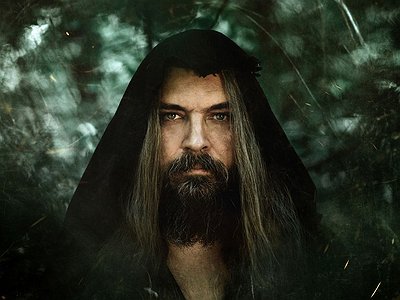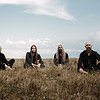Part 1
Name: Edmond Karban (of Dordeduh, Sunset in the 12th House, and ex-Negura Bunget)
Occupation: Frontman Dordeduh, guitarist Sunset in the 12th House, owner of Consonance Music
Nationality: Romanian
Current release: Dordeduh's debut full-length album Dar De Duh has just been repressed on yellow vinyl. Their sophomore effort Har is still available from Prophecy.
If you enjoyed this interview with Edmond Karban and would like to stay in touch with his work, visit Dordeduh's official homepage or their social media accounts on Instagram, and Facebook. Sunset in the 12th House are also on Facebook.
When did you start writing/producing/playing music and what or who were your early passions and influences? What was it about music and/or sound that drew you to it?
I have been interested in playing music since a very early age. I started playing music in 1990. Before that I was more concerned with crafting my instruments, because the communist regime that existed did not provide tools for the arts.
I had a DIY approach towards the instruments and all the technical challenges that came with it and I learned to play instruments in a DIY manner. In 1992 I wrote my first riffs which were for a band called Hell Survivor, but later on was included in the EP we released with Makrothumia in 1995.
I could say that I started working on the production before I had my first projects as sound engineer. I produced my own music ever since I was in Makrothumia and Wiccan Rede which became Negura Bunget.
My first job as a sound engineer started when we recorded Maiastru Sfetnic.
The engineers were completely unfamiliar with the black metal sound and many things didn’t make any sense for them, because black metal sounds raw and dirty, broken in a way and they completely didn’t get that. That was my first attempt to get behind the potentiometers.
When I listen to music, I see shapes, objects and colours. What happens in your body when you're listening and how does it influence your approach to creativity?
I heard that geniuses see shapes, numbers, colors when they hear music. I’m unfortunately not part of them.
On the other hand I tend to get inspired when I meet people who have a certain level of mastery in whatever domain. It’s very inspiring to see someone who’s really good at something; someone who mastered something.
How would you describe your development as an artist in terms of interests and challenges, searching for a personal voice, as well as breakthroughs?
I always wanted to make music. My own music. And I also knew that spirituality would play a major role in my life since I was very young. In Romania’s communist era the exposure to the music was almost nonexistent. All that was available were songs to glorify the regime and even that was extremely limited.
When I was about 5 I dived into DIY electronics and I started gradually building more and more complex boards until I was 7 when I built my first antenna amplifier. This allowed me to be able to watch Serbian and Hungarian television and with that I came in contact with the 80s music that was trending in those days. Being able to watch those television channels had a big cultural impact on me. I think I could call this my first breakthrough.
Then in 89 came the “revolution” and right after that I formed a couple of local bands. First was Hell Survivor, after that Putrefaction and then Makrothumia and Wiccan Rede, the bands that I had my first rehearsal tapes recorded with.
In '94 we played on stage for the first time with Makrothumia and in '95 I had the first official EPs for both bands. Then the second cultural breakthrough happened, when we started playing outside Romania. Our first shows were in Hungary, Czech republic and Serbia.
Then I realized that we’re so backwards in everything … we looked like shit (we had no metal clothing available in our country), we sounded like shit (we had shity equipment), we played like shit. I immediately realized that all of this had to change, if we wanted to be progress and get invited to play outside our country. All these were pre internet, pre mobile phones, pre youtube tutorials. One had to figure it out on their own. We had to write physical letters to the festivals. It was the tape trade era.
The next breakthrough came when I started doing studio work. The whole musical journey has shaped differently since then.
On the other hand in the mid 90s I was introduced to anthropology and a bit later to psychedelics. Anthropology was the closest thing to spirituality that I could get into within an academic environment.
Tell me a bit about your sense of identity and how it influences both your preferences as a listener and your creativity as an artist, please.
I always searched for connection, even though I was a very introverted person and probably still am to a certain degree. For me music was always about connection and healing. Since my early days in music, I made a clear distinction between music for the spirit and music for the soul.
Music for the spirit was something transcendent and it fit very well with the black metal concept. There, the sense of identity was not needed. The only and very hard thing to obtain was to be able to let things flow through you, with very little or no touch of your personality. That’s why we used corpse paint and a pseudonym, because the person was not the center of the creation. Transcendence was.
On the other hand Makrothumia was the place where I could express who I was, what my preferences were, my personality and so on. That was the music for the soul. Nowadays all these meet up in Dordeduh, as the name itself suggests.
What, would you say, are the key ideas behind your approach to music and art?
The key idea would definitely be spirituality.
It's a very broad and often misused term. I always avoid using it, but if I were to say esoterism it would sound even more confusing. In our big tribal nature, as human beings, that’s what we completely forgot about: spirituality and our cosmic heritage.
How would you describe your views on topics like originality and innovation versus perfection and timelessness in music? Are you interested in a “music of the future” or “continuing a tradition”?
I am in constant search for novelty in music. I am all for discovering and experimentation. But nowadays it's definitely hard to come up with something new, something original.
In the past the creative side always lay inside myself. I was very driven to express a certain message. Nowadays, because I am in tune with different vibes around me, I often find that relatively random things inspire me to envision different musical scenarios.
I see innovation versus perfection and timelessness as very different things. Innovation is born from inspiration and in my case the inspiration comes from those very rare moments of “flow”; when one puts their hand on a pen, for example, and writes down everything from one flow. Sometimes it needs a bit of correction afterwards, but the core of the artistic act comes from that state of “flow”. I attain that state after long sessions of meditation, when the void gets denser around me.
When it comes to perfection, one feels when an opus reaches perfection. And that's not when things are perfect; it's more when one feels that the process has been completed, that there's nothing left to do. Timelessness is something that no one can predict in advance. It's something that happens and gets objective validation.
Over the course of your development, what have been your most important instruments and tools - and what are the most promising strategies for working with them?
I come from a generation that was building its own instruments. When I was very young I knew that I wanted to make music, but the social context was such that in communism instruments were nowhere to be found. We had only one factory for instruments in the whole country and most of the production was destined for export. It was very rare to be able to buy an instrument. Needless to say we were very poor.
I started to build my first guitar when I was around 7. It was a failure, but that was the first attempt. The first functional guitar I made was when I was about 12 years old. I managed to procure an acoustic guitar for kids which I modified by making its body thinner and I added a handmade pickup. I wound the wire for 9 hours, continuously, coil by coil. The thread was thinner than the hair. It was a real challenge but it was worth it.
I remember that I made a fuzz pedal months before finishing with my guitar project. This fuzz pedal had no case yet and was spread on the bed. This went into a modified radio that I used as an amplifier. That was my first setup. For me it was a huge success. I still remember the excitement I had, the feelings I felt for the first time when I heard the distorted sound when I touched the strings; the smell in my room …
For me the key is to try and to experiment and further shape the experience into something that is personal and has the right vibe, the right tune.






